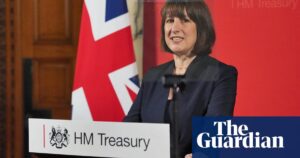Nicolás Maduro has been declared the winner of Venezuela’s presidential election by the government-controlled electoral authority – a result that appeared to dash opposition hopes of ending his authoritarian, socialist rule after 25 years, and which was immediately challenged by rivals and several governments in the region and beyond.
After a six-hour delay in releasing the results of Sunday’s poll sparked an outpouring of international concern, Venezuela’s electoral council claimed Maduro had won with 51.21% of votes compared with 44.2% for his rival, the former diplomat Edmundo González Urrutia.
The council said with about 80% of votes counted, Maduro had secured more than 5m compared with González’s 4.4m.
Independent observers had described the election as the most arbitrary in recent years, even by the standards of an authoritarian regime that started with Maduro’s mentor and predecessor, Hugo Chávez.
Critics blame Maduro for leading Venezuela into a crippling economic and social crisis, as well as turning the country into an increasingly repressive state where political opponents are routinely jailed and tortured.
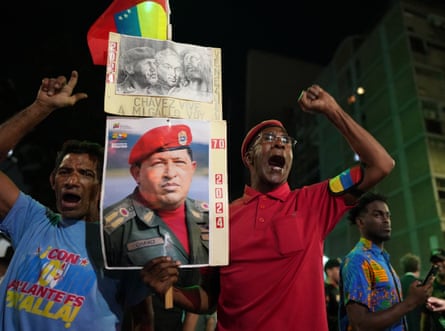
González’s campaign had generated a rare wave of optimism among millions of disillusioned citizens after a wretched decade during which the economy of the country with the world’s largest oil reserves contracted by 80% and nearly 8 million people – almost a third of Venezuela’s population – fled abroad.
Maduro dedicated his win to Chávez, who anointed Maduro as his successor shortly before his death in 2013. “Long live Chávez. Chávez is alive!” Maduro shouted.
Addressing supporters in the capital, Caracas, the 61-year-old leader said: “I am Nicolás Maduro Moros – the re-elected president of the Bolivarian Republic of Venezuela … and I will defend our democracy, our law and our people.”
But the opposition camp was quick to dispute the results. “The Venezuelans and the entire world know what happened,” González said in his first remarks.
The opposition leader, María Corina Machado – who had thrown her weight behind González’s campaign after being banned from running – rejected the result, claiming the opposition had won in every single state.
“We won and everybody knows it,” she said. “We haven’t just defeated them politically and morally, today we defeated them with votes,” Machado told journalists, claiming González had in fact won the contest and should be considered the country’s president-elect.
Although the result was celebrated by Maduro’s regional allies, the US and others expressed concerns that the vote may have been compromised.
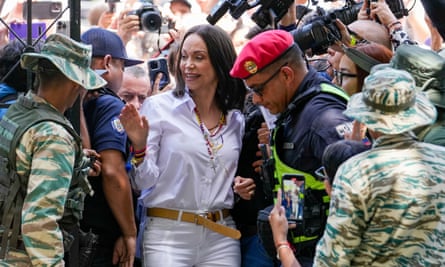
The Cuban leader, Miguel Díaz-Canel Bermúdez, said the “historic victory” was a triumph of “the dignity and courage of the Venezuelan people”, while Bolivia’s leftwing leader, Luis Arce, noted the election had been held on what would have been Chávez’s 70th birthday. “What a great way to remember the Comandante Hugo Chávez,” Arce tweeted.
The US secretary of state, Antony Blinken, said his government had “serious concerns that the result announced does not reflect the will or the votes of the Venezuelan people”.
“It’s critical that every vote be counted fairly and transparently, that election officials immediately share information with the opposition and independent observers without delay, and that the electoral authorities publish the detailed tabulation of votes. The international community is watching this very closely and will respond accordingly,” Blinken added.
A similar call came from Spain’s foreign minister, José Manuel Albares, who said his government wanted to see a breakdown of the results before recognising Maduro’s win.
“The people of Venezuela yesterday voted democratically and in very large numbers,” Albares told Spain’s Cadena Ser radio on Monday morning. “We want total transparency and that’s why we’re asking for the results to be published, polling station by polling station. We don’t have a candidate – we just want a guarantee of transparency. The publication of polling station information is key so that the results can be verified.”
Chile’s president, Gabriel Boric, tweeted: “Maduro’s regime must understand that the results it has published are hard to believe … Chile will not recognise any result that is not verifiable.”
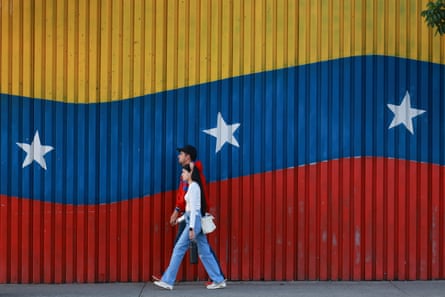
Peru’s foreign minister, Javier González-Olaechea, said his government also rejected the result. “Peru will not accept the violation of the popular will of the Venezuelan people,” he tweeted.
The government of Costa Rica said it categorically rejected what it considered a “fraudulent” result, while the president of Uruguay, Luis Lacalle Pou, said the count had been “clearly flawed”. “You cannot recognise a triumph if you do not trust the form and mechanisms used to achieve it,” Pou said.
The result was a bitter blow to Venezuela’s notoriously fractured opposition, which had united around the unlikely candidacy of González – a 74-year-old former ambassador and political neophyte – hoping he could help lead the country out of one of the worst peacetime economic collapses in modern history.
In an interview with the BBC on the eve of the hotly awaited election, Machado claimed the oil-rich South American country was approaching a “huge, unique, epic event that will change not only the history of Venezuela but also the whole region”.
“The system is cracking for the first time in 25 years,” Machado claimed of chavismo, predicting a “huge, historic turnout” that would sweep Maduro from power.
Throughout the day opposition voters turned out in large numbers across the country, hoping to vote Maduro out of power.
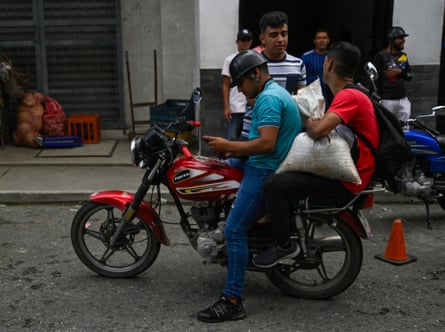
“I voted for Edmundo González because I believe he is the only hope of change that we have here,” said Anabella Donzella, a 23-year-old economics student as she cast her vote in El Marqués, a middle-class area in Caracas.
Maduro, who was elected after Chávez’s death from cancer and returned to office in a widely criticised 2018 election boycotted by the opposition, appeared confident as he visited his late leader’s tomb in Caracas to lay a wreath before dawn on Sunday.
Wearing a pink guayabera and flanked by the first lady, Cilia Flores, Maduro likened the election to one of the most famous military showdowns in Venezuela’s struggle for independence from Spain. “This is our battle of Carabobo and we are heading straight for victory,” he said, dedicating his campaign to Chávez, under whom he served as foreign minister and vice-president.
Source: theguardian.com













